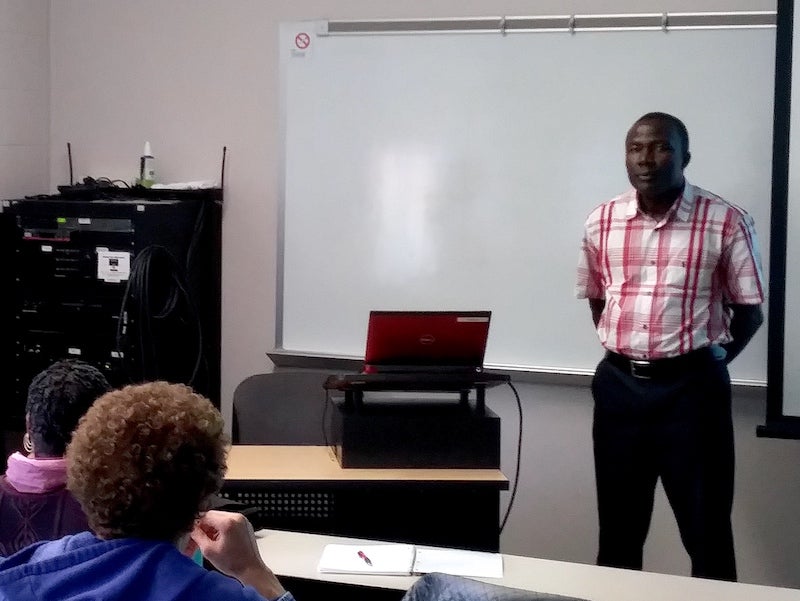Collaboration aims to educate students, improve health care in developing world
When Ebola broke out in Liberia in 2014, more than 11,000 severely ill people sought treatment in one of the few medical clinics available. Health professionals were faced with the daunting task of trying to save thousands of people with a tiny staff of care workers, few supplies, and a lack of medication and technological equipment that are commonplace in more modern medical facilities.
Despite the disadvantages and staff shortages, the West African nurses and doctors were able to save most of the patients who had fallen ill. But with better technology and greater access to medications and treatment knowledge, perhaps some of the 4,800 who perished could have been saved.
It is a common problem in developing countries, not only for health care workers but also for teachers trying to prepare the next generation of medical professionals, according to Professor Philip Davis, a nursing educator at William V.S. Tubman University in Liberia. Davis, who is visiting the URI College of Nursing as part of an exchange program with Tubman University, has been offering lectures on global health and health care disparities at the Nursing Education Center in Providence and on the Kingston campus, where he detailed his experiences working through the Ebola crisis before a group of URI nursing students.
Many schools in Liberia face a shortage of resources, lacking computers and other technological equipment commonplace at URI and most American universities. Even books are in short supply, presenting challenges to teachers. The advanced simulation labs on the Kingston campus and at the NEC would be particularly helpful to train students, Davis said. The labs, designed to mimic an actual hospital setting, combine sophisticated mannequins that respond to changing conditions as well as actors who give students the chance to experience critical care conditions in a controlled environment.
“We have a lot of limitations in terms of the sim lab. At the Nursing Education Center, the sim labs really enhance learning. At home, we just practice on a doll,” Davis said, noting he hopes to follow the NEC’s lead in hiring actors to portray patients. “What is a gap for us is an opportunity for students to learn. I wanted to see what educational practice is on the other side of the world; see how we can improve education and practice in Liberia.”
The exchange of ideas and information will continue when a group of URI Nursing students travels to Liberia during spring break 2018 to help treat patients at a Partners in Health clinic. Elaine Parker-Williams, a doctoral student in nursing at URI who is from Liberia, will lead the nurse practitioner students who will work with patients at J.J. Dossen Memorial Hospital in Maryland County, Liberia, especially those suffering from diabetes and hypertension, among the leading causes of death in West Africa.
The URI students — Bethany MacLeod, Kristen Remeika, Caryn Amedee, Phoebe Hall and Christina Lewis — will have a chance to learn by practicing on actual patients. They will also gain experience from health care workers who must perform in less than ideal conditions, Davis said.
“They’re going to see the situation health care workers are in without resources,” Davis said, though he noted conditions are better at Partners in Health clinics like the one the students will visit. “How can you learn with the resources we have here? How can you provide good care without the resources?”
The resources are starting to improve, thanks to organizations like Partners in Health and collaborations like this one with URI, Davis said. When the 2014 Ebola outbreak began, ignorance and misinformation contributed to the spread of the disease, he said. Some health care workers misinterpreted the early symptoms of chills, fever and aches as the onset of malaria. Cultural traditions that encourage direct human contact continued during the outbreak, and burial ceremonies, which also involve touching of a body that remains contagious long after death, contributed to the Ebola spread.
Prior to the outbreak, there was just one lab in Liberia conducting Ebola research. Now, there are 25, Davis said. Better research methods have now produced an Ebola vaccine. A better organized health structure and more community outreach have helped change traditional practices to help minimize the risk of another outbreak, Davis said.
“We need programs that will improve our curriculum content. We need professionals to teach specialty programs,” Davis said. “We need these collaborations.”

